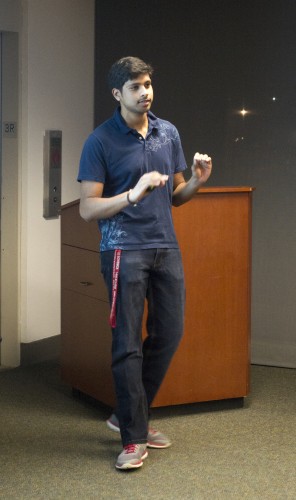 PRANAV SATHYANARATANAN ’16 STOOD in front of the Student Senate and presented on the future of electronic voting.
PRANAV SATHYANARATANAN ’16 STOOD in front of the Student Senate and presented on the future of electronic voting.This week’s meeting began with a presentation by Michael Han ’16, head of the Facilities and Services Committee. He briefly explained Slack, the new communications technology that FSC is using. In it, members are able to comment and post on certain channels with their ideas about how certain projects should be moving forward and other discussion points. Han pointed out that within Slack, members are able to stay updated on the projects they are interested in and won’t be bothered by the others. Han invited the rest of the Senate to join the discussion and believes it is a valid tool in his committee’s development of projects.
Elizabeth Anderson ’14, chairman of the Student Sustainability Task Force, spoke on behalf of the Green Revolving Fund project. Anderson explained the project has extended to something much larger than a typical club and was, at one point, an initiative on the president’s cabinet. The idea is that money would be put into the GRF and go toward a project that would both improve RPI’s green initiative and save money in some sense. After the project was chosen, designed, and implemented, the money saved would return to the GRF and the process would repeat. Anderson had come to Senate in order to gain perspective on the project and gather advice on behalf of Daniel Sze ’18. The project is currently in need of members as the goal of 20 active members has not been reached with the current population of 13.
After confirming that this sort of project had not been implemented at RPI before, Shoshana Rubinstein ’16 questioned if the green roof above the bookstore would qualify as a part of the GRF. Anderson responded that because the green roof does not save money in any significant way, there is no way it can be incorporated into the GRF as there are no funds that would “revolve.” Lexi Rindone ’15 brought up the idea to work with professors to make the work on the GRF count as a one-credit course while Grand Marshal Kyle Keraga ’15 asked what barriers stood in the way of success. Anderson reported that the process of deciding which projects were picked, ensuring that the money revolved within the fund, and the actual procuring of the starting funds were largest complications that the group was dealing with now.
The floor was then taken by Pranav Sathyanarayanan ’16 and Anthony Barbieri ’15 who discussed the electronic voting process that was taken on by the Rules and Elections Committee. Sathyanarayanan started by explaining how the voting process would be done which began with an R&E member setting up the poll at the proper time in the usual voting stations. Then, students would be able to come to these poll sites, swipe their cards, and vote accordingly. Upon reaching the end of the process, students would then be able to get their mug, as per RPI tradition. Sathyanarayanan made sure to note that there is no way to tie one person’s RIN to their vote as these two sets on information are kept on entirely separate tables with RINs being recorded on one and the vote count for a particular candidate or referendum on another.
Rubinstein questioned how it could be ensured that voters would be able to vote only for their particular class and for either their Greek or independent representative, depending on their status. Barbieri explained that the information would be tracked to the school’s Banner which tracks class year, credits, and Greek affiliation, all of which are pertinent details to the election. Current R&E member and class of 2017 Senator Paul Ilori mentioned that in the past, R&E members have had to either hand-count or use a Scantron to determine the winner of the election, a process which was both tedious and uncertain. Graduate Senator Jen Wilcox wondered what would happen should the system crash, to which Barbieri assured the crowd that backups did exist and the coding staff of students would be on site should any fixes need to occur. Ilori mentioned that testing of the system by the public would occur once the proper has been procured.
The meeting ended with committee reports, in which the Student Policy Subcommittee reported that they would be switching their efforts from the revision of the Rensselaer Handbook and Student Rights and Responsibilities to the universal access policy due to the lack of available work on the former. The Grand Marshal’s report mentioned that the most recent Student Senate survey was viewed by over 800 RPI affiliates which surpassed the Senate’s goal. Survey results will be available next week on RPI’s Flagship.
